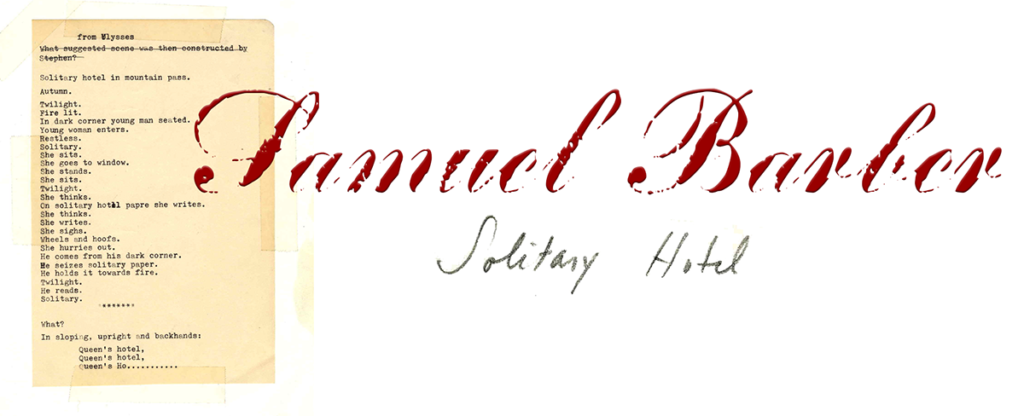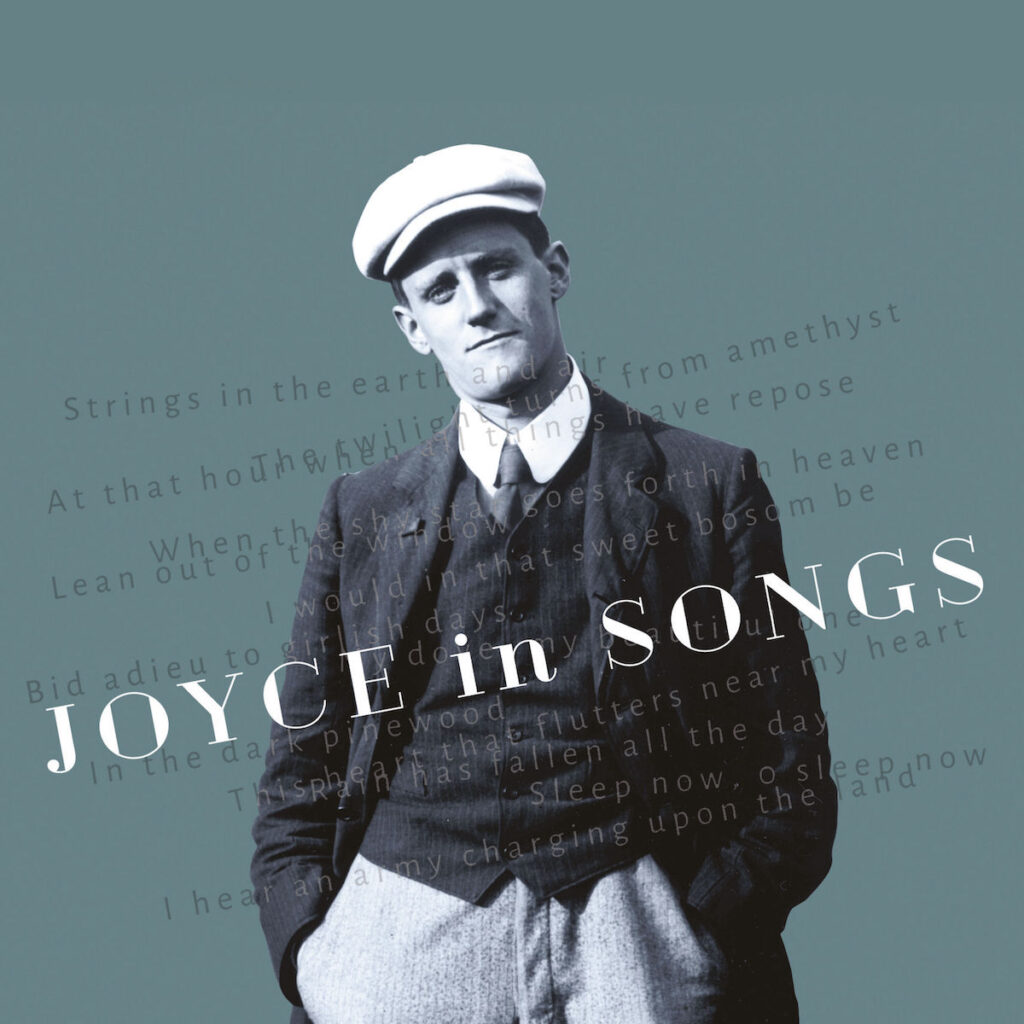Joyce Music – Barber: Solitary Hotel
- At March 06, 2022
- By Great Quail
- In Joyce
 0
0
“Solitary Hotel”
Song 4 from Despite & Still, op. 41
(1968)
For voice and piano
(Like a rather fast tango; op. 41; From Ulysses)
The saddest of all Barber’s Joyce songs is “Solitary Hotel,” the fourth song in Despite & Still, op. 41. The five-song suite was written during a period of depression following the failure of his opera Antony and Cleopatra. Adapted from the “Ithaca” catechism in Ulysses, “Solitary Hotel” begins with Stephen’s playful idea for an intriguing setting: a solitary, alpine hotel where a pensive woman flirts with a mysterious letter. The fanciful scenario comes crashing down when mention of Queen’s Hotel reminds Bloom of his father’s suicide.
Often described as “enigmatic,” the sparse lyrics are telegraphed above a desultory tango played on piano. The climax of the song is the question “What?”, the answer to which throws open the doors of sorrow. The song terminates in the middle of the repetition, “Queen’s hotel, Queen’s hotel, Queen’s ho…” (For those playing at home, this is one fewer repetition than Joyce.) The script-like lyrics and declamatory vocal afford the singer a broad license of interpretation, and of all Barber’s Joyce songs, “Solitary Hotel” is the most varied in performance. It’s been sung by sopranos, mezzos, tenors, and baritones. The climactic “What?” is always a highlight, whether sung, spoken, breathed, screeched, or gasped.
Excerpt from Samuel Barber: The Composer and His Music
By Barbara Heyman
Samuel Barber: The Composer and His Music
Oxford University Press, 1992
The cycle Despite and Still, Op. 41, taking its name from the last song of the group, was completed in June 1968 and dedicated to Leontyne Price, who gave the first performance with pianist David Garvey on 27 April 1969 at Avery Fisher Hall. The songs are both intellectually and vocally challenging, which may explain why they have been the most neglected of the Barber repertoire in this genre. In their keenly dramatic rendering of enigmatic texts, the songs (especially Nos. I, III, and V) represent the duality of Barber’s mature style—an affinity for late nineteenth-century German Romantic Lieder and a free use of twentieth-century harmonic language.
The diverse texts—three by Robert Graves (the poet’s “A Last Poem,” pointedly retitled “A Last Song”; “In the Wilderness”; and “Despite and Still”), Theodore Roethke’s “My Lizard,” and a paragraph from James Joyce’s Ulysses, beginning “Solitary hotel in mountain pass”—might seem an illogical grouping, especially to those with only a casual knowledge of the composer’s personal demons. One critic, for example, found the thoughts “disparate, compartmented, and unrelated to each other. An enigma.” All the texts of the five songs, however, suggest that the cycle has profound biographical significance, perhaps even acting as a catharsis for the composer; they probe bleak themes about loneliness, lost love, and isolation—in the creative quest, in old age, in the pious mission.
Barber believed the texts for Op. 41 (as well those for Op. 45) asked for more dissonant music than his earlier songs. Characteristic of the harmonic language of the group is a tendency toward tonal ambiguity—a blurring of tonal centers—with tritones, full chromaticism, conflicting triads, and whole-tone scale segments directed toward a vivid expression of textual imagery.
Op. 41, No. 4, “Solitary Hotel,” from a passage in the “Ithaca episode” near the end of Joyce’s Ulysses, is a description of a scene constructed by Stephen Dedalus for Bloom. Earlier in Joyce’s narrative, a question about Bloom had been presented: “What example did he adduce to induce Stephen to deduce that originality, though producing its own reward, does not invariably lead to success?” The question would have been of great interest to the composer who believed his Antony and Cleopatra to be unappreciated. For the vocal part, Barber used a declamatory, syllabic style that mirrors the bare language of Joyce’s descriptive passage, in which short phrases—sometimes consisting of only one or two words—seem analogous to a series of musical motives. A monotone recitative juxtaposed against the piano’s tango creates an atmosphere of emotional distance, like a memory preserved in a faded photograph. As in Joyce’s passage, the singer ends in midword, the text’s inconclusiveness mirrored in the final chord.
Liner Notes from Samuel Barber: The Complete Songs
By Dylan Perez
Samuel Barber: The Complete Songs
Resonus, 2022
Born in 1910, Samuel Barber knew what he wanted from very early in his life. Such strength of character and courage to follow his path is heard in his music; at a me when American classical music was heavily influenced by experimentalism, Barber’s inclination for ‘traditional’ harmony and melody helped set him apart. What I have always loved about Barber’s vocal music is the ease he finds in the marriage of text and music. Even in the posthumous songs, some recorded here for the first time, he always puts the text first, inspired by both contemporary and ancient texts.
Barber had a long fascination with the words of James Joyce. As a truly intelligent and well-read composer, we can hear his understanding of even the thickest of Joyce’s texts in his Three Songs, Op. 10… In Nuvoletta, Op. 25, Barber returns to James Joyce, this time excerpting from Finnegans Wake….
Perhaps the most harmonically adventurous set of songs, Despite and Still, Op. 41, was written after a prolonged period of compositional and emotional depression which stemmed from his personal life and the perceived failing of his opera Antony and Cleopatra. You can hear Barber’s tortured soul in these songs and they were perhaps written to help him get through his darker moments. The poetry deals with couples: ‘A Last Song’ is an argument and ‘My Lizard’ is a wish for young love never to grow old. ‘In the Wilderness’ is about Christ and a follower cast out of society wandering and conversing with the lesser of society. ‘Solitary Hotel’ is enigmatic; we are dropped into hotel witnessing an exchange we don’t understand. The anger in ‘Despite and Still’ is palpable in the hammered piano part, this couple is staying together regardless of their differences.
Text
“Solitary Hotel” from Despite & Still, op. 41
Solitary hotel in a mountain pass.
Autumn. Twilight. Fire lit.
In dark corner young man seated.
Young woman enters.
Restless. Solitary. She sits.
She goes to window. She stands.
She sits. Twilight. She thinks.
On solitary hotel paper she writes.
She thinks. She writes. She sighs.
Wheels and hoofs. She hurries out.
He comes from his dark corner.
He seizes solitary paper.
He holds it towards fire. Twilight.
He reads. Solitary. What?
In sloping, upright and backhands:
Queen’s hotel, Queen’s hotel, Queen’s ho…
Ulysses: “Ithaca”
The origin of the song is a passage from Ulysses, one of the “catechisms” of the penultimate “Ithaca” episode:
Which example did he adduce to induce Stephen to deduce that originality, though producing its own reward, does not invariably conduce to success?
His own ideated and rejected project of an illuminated showcart, drawn by a beast of burden, in which two smartly dressed girls were to be seated engaged in writing.
What suggested scene was then constructed by Stephen?
Solitary hotel in mountain pass. Autumn. Twilight. Fire lit. In dark corner young man seated. Young woman enters. Restless. Solitary. She sits. She goes to window. She stands. She sits. Twilight. She thinks. On solitary hotel paper she writes. She thinks. She writes. She sighs. Wheels and hoofs. She hurries out. He comes from his dark corner. He seizes solitary paper. He holds it towards fire. Twilight. He reads. Solitary.
What?
In sloping, upright and backhands: Queen’s Hotel, Queen’s Hotel, Queen’s Hotel. Queen’s Ho. . .
What suggested scene was then reconstructed by Bloom?
The Queen’s Hotel, Ennis, county Clare, where Rudolph Bloom (Rudolf Virag) died on the evening of the 27 June 1886, at some hour unstated, in consequence of an overdose of monkshood (aconite) selfadministered in the form of a neuralgic liniment composed of 2 parts of aconite liniment to 1 of chloroform liniment (purchased by him at 10. 20 a.m. on the morning of 27 June 1886 at the medical hall of Francis Dennehy, 17 Church street, Ennis) after having, though not in consequence of having, purchased at 3.15 p.m. on the afternoon of 27 June 1886 a new boater straw hat, extra smart (after having, though not in consequence of having, purchased at the hour and in the place aforesaid, the toxin aforesaid), at the general drapery store of James Cullen, 4 Main street, Ennis.
Did he attribute this homonymity to information or coincidence or intuition?
Coincidence.
Recordings
Complete Songs
There are three recordings of Samuel Barber’s complete songs available on compact disc.
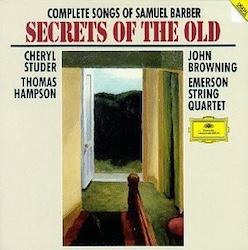 |
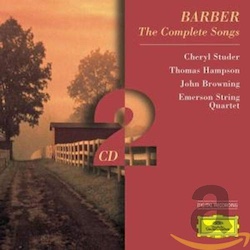 |
Barber: The Complete Songs (1994)
Piano: John Browning
Vocalists: Cheryl Studer, Thomas Hampson
CD: Complete Songs of Samuel Barber: Secrets of the Old. Deutsche Grammophon 435 867-2 (1994)
Reissue CD: Barber: The Complete Songs. Deutsche Grammophon 459 506-2 (2002)
Purchase: CD [Amazon], Digital [Presto Music]
Online: YouTube [Album Playlist | Solitary Hotel]
Recorded in 1991-1992 and released on Deutsche Grammophon in 1994, this venerable 2-CD set has never been out of print, a mandatory purchase for fans of Samuel Barber’s elegantly-crafted art songs. It features the soprano Cheryl Studer and the baritone Thomas Hampson, with John Browning on piano and the Emerson String Quartet backing Dover Beach. Having boasted several album covers and titles—including Secrets of the Old—this set continues to shine thirty years later. The liner notes are sparse and the production favors contemporary notions of close-miking and reverb, but the performances are stellar, all musicians in top form. John Browning was Barber’s own choice to première his Pulitzer-Prize winning Piano Concerto, so he’s as definitive a Barber interpreter as the twentieth century has to offer. Cheryl Studer is magnificent. While some operatic sopranos might be tempted to showy displays, Studer allows the lyrics to dictate her delivery, and she touches each word with an appropriate amount of grace, irony, impishness, and sorrow. (Her Nuvoletta is a delight!) And Thomas Hampson’s silky baritone is always a pleasure to hear. Although his voice is darker than the tenor Joyce had in mind, he brings a richness to each of his selections, especially the dramatic clangor of “I hear an army.” A collection that’s stood the test of time, Secrets of the Old—or whatever it’s being called at the moment!—belongs in the library of every classical music fan.
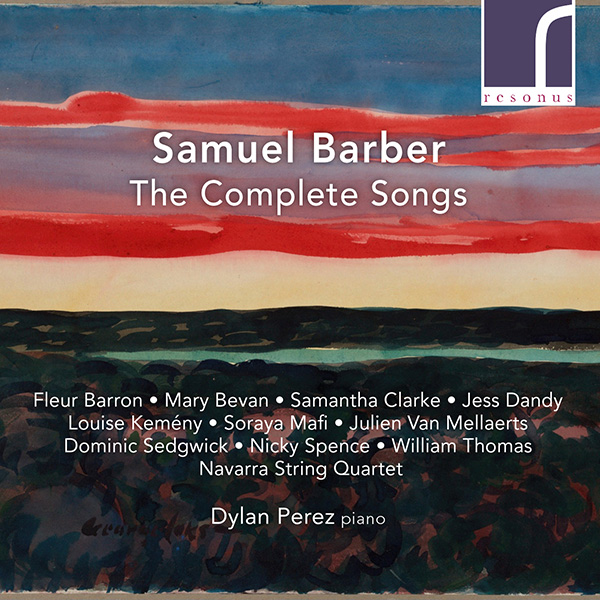
Samuel Barber: The Complete Songs (2022)
Piano: Dylan Perez
Vocalists: Fluer Barron, Jess Dandy, Louise Kemény, Soraya Mafi, Dominic Sedgwick, Nicky Spence, & others
CD: Samuel Barber: The Complete Songs. Resonus RES10301 (2022)
Purchase: CD [Amazon], Digital [Presto Music]
Online: YouTube [Album Playlist | Solitary Hotel]
Since 1994, fans of Samuel Barber had only the Deutsche Grammophon Secrets of the Old set to represent Barber’s complete songs. As good as that set is, thirty years of the same interpretations can become overfamiliar. Fortunately, this remarkable 2-CD set by Resonus has arrived to freshen things up. “Solitary Hotel” is performed by British singer Dominic Sedgewick. He outlines Stephen’s scene with perfect clarity, telegraphing each sentence in his rich baritone. It’s a masterful performance of a difficult song, and his climactic “What?” is chilling. Visitors interested in reading more are directed to the Brazen Head review of this collection.
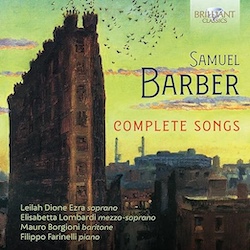
Samuel Barber: Complete Songs (2023)
Piano: Filippo Farinelli
Vocalists: Leilah Dione Ezra, Elisabetta Lombardi, Mauro Borgioni
CD: Brilliant Classics 96514 (2023)
Purchase: CD [Amazon], Digital [Presto Music]
Online: YouTube [Album Playlist | Solitary Hotel]
Following close on the heels of the Resonus set is this wonderful release by Brilliant Classics, boasting no less than 65 of Barber’s songs—all the standard pieces from the famous Browning collection, plus many more early and lesser-known works. As usual, Farinelli’s playing is masterful, investing “Solitary Hotel” with hesitation and fragility. Visitors interested in reading more are directed to the Brazen Head review of this collection.
Selected Songs
“Solitary Hotel” is available on the following collections:
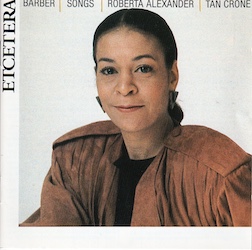
Barber: Three Songs op. 10; “In the dark pinewood” (1988)
Piano: Tan Crone
Soprano: Roberta Alexander
CD: Barber: Songs. Etcetera KTC 1055 (1988)
Purchase: CD [Amazon]
Released in 1988 on Etcetera, this set features the soprano Roberta Alexander accompanied by pianist Tan Crone. For the interests of Joyce enthusiasts, the CD contains Three Songs op. 10, Nuvoletta, “Solitary Hotel,” and “In the dark pinewood.” Alexander also recorded a version of “I hear an army” with full orchestra.
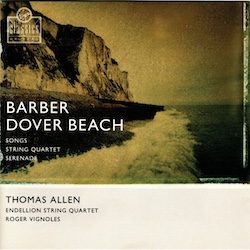 |
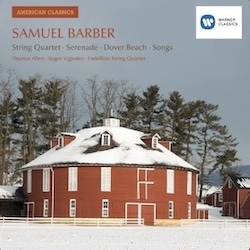 |
Samuel Barber: Three Songs op. 10 (1994)
Piano: Roger Vignoles
Baritone: Sir Thomas Allen
CD: Barber: Dover Beach. Virgin Classics 7243 5 45033 2 0 (1994)
Reissue CD: American Classics: Samuel Barber. EMI Classics 50999 6 95232 2 9 (2009)
Purchase: CD [Amazon], Digital [Amazon | Presto Music]
Online: YouTube [Album Playlist | Solitary Hotel]
This collection was originally issued on CD by Virgin Classics Digital. It was reissued in 2009 by EMI with a different name, a new cover, and five additional tracks: the songs of Despite and Still, op. 41, with Eric Cutler singing tenor and Bradley Moore on piano. For the interests of Joyce enthusiasts, both versions contain Three Songs op. 10 and “Now have I fed and eaten up the rose,” but only the 2009 EMI release features “Solitary Hotel.” The Robert Vignoles/Thomas Allen songs were recorded at St. George’s Church in Bristol in April 1993. Allen has a strong, resonant baritone and Vignoles is a capable accompanist, but there’s nothing to recommend this disc over the superior DG set released that same year. There’s also a hollowness to the sound quality that one associates with budget releases. Despite and Still fares better than the earlier recordings, but it’s safe to give this collection a pass.
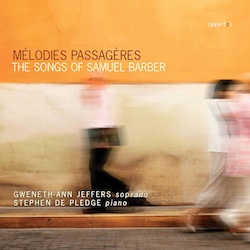
Samuel Barber: Three Songs op. 10 (2012)
Piano: Stephen de Pledge
Soprano: Gweneth-Ann Jeffers
CD: Mélodies Passagères: The Songs of Samuel Barber. Quartz QTZ2079 (2012)
Purchase: CD [Amazon], Digital [Presto Music]
Online: YouTube [Album Playlist | Solitary Hotel]
Featuring British soprano Gweneth-Ann Jeffers and Kiwi pianist Stephen de Pledge, this collection takes its name from Barber’s suite of Rilke settings. For the interests of Joyce enthusiasts, the album contains Three Songs op. 10, Nuvoletta, and “Solitary Hotel.”
It’s the opus 10 Chamber Music songs that command the most attention here. Traditionally sung by a baritone, these songs are illuminated quite differently by Jeffers’ soprano, a tone frequently noted for its brightness and vibrato. “Rain has fallen” floats like an ethereal dream, gently buoyed by de Pledge’s responsive piano. “Sleep now” begins much the same, but its “unquiet” turn feels particularly sharp and anxious, shot through with spiky notes before slowly fading back into a dream. As usual, “I hear an army” is the main event, pushed into the stratosphere by Jeffers’ operatic soprano. As often happens when a familiar song is sung by someone of the opposite gender, it takes on unexpected nuances and new shades of meaning—think of the liberation of Patti Smith’s “Gloria,” or the desperation of Jack White’s “Jolene.” Here Joyce’s charging army seems less a manifestation of the singer’s unleashed emotions than a threat against her very safety, a symbol of her betrayal that threatens to overwhelm her. This is especially noteworthy in the final stanza. “My heart, have you no wisdom thus to despair” is quietly voiced from a place of complete brokenness; but as the repetitions of “my love” gather momentum, the song climaxes in an outburst of righteous anger: “why have you left me alone?” With most baritone singers, the emphasis falls on “alone,” but Jeffers makes it clear her concern is “why.”
Jeffers gives Nuvoletta an adroit reading that takes full advantage of her range, milking “O! O! O! Par la pluie!” for all its worth. Her phrasing takes cues from Leontyne Price’s original, but unfolds at the contemporary faster tempo. Fortunately Jeffers’ operatic stylings are not at the expense of Joyce’s wordplay, and she’s the first recorded singer to pronounce “squir’ls” as a pun on “squires.” (Or maybe “squeals?”)
Of all the Joyce-related songs on this recording, “Solitary Hotel” is the weakest. De Pledge is too forward in the mix, obscuring Jeffers’ hushed intonations and clashing against her soaring moments of alarm. The production is additionally hampered by too much echo; a problem with the piano throughout the set, but especially troublesome here. Nor does Jeffers bring anything particularly interesting to the song, playing it for melodrama rather than nuance. Many sopranos have recorded “Solitary Hotel” since the release of Mélodies Passagères, and most have showed more sensitivity to the delicacy of Barber’s setting and mood.
Although I would have preferred a dryer production and more evenly-balanced piano, Mélodies Passagères is an essential Barber recording, despite the occasional misstep.
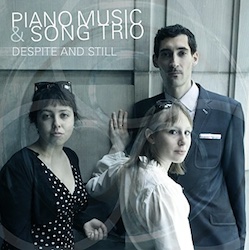
Barber: “Solitary Hotel” (2014)
Musicians: Jordan McLean, Derin Oge, Anneke Schaul-Yoder
CD: Despite and Still. System Dialing Records (2014)
Purchase: Digital [Amazon]
Online: YouTube [Album Playlist | Solitary Hotel]
This is…an odd recording. It’s essentially “Solitary Hotel” played on piano, cello, and trumpet; but the “vocals” are delivered as sprechstimme, a male and female voice electronically altered to sound like old-timey radio voices. As the label explains, “This collection of songs invites the listener to revisit experiences of loneliness, seclusion, reconciliation, and happiness regardless of external circumstances. Save for song titles and a couple of cryptic guest vocal appearances, all lyrical (literary) cues have been removed, leaving behind the now-revitalized lyrical (musical) content to guide us out of the wilderness. Arrangements of these selections were developed as, and are realizations of the crafts of orchestration, improvisation and ensemble performance (listening).” I don’t know—it kinda works for me; but then again, I’m a big fan of Dickie Cricket and Kid Jersey’s Monsters of Megaphone.
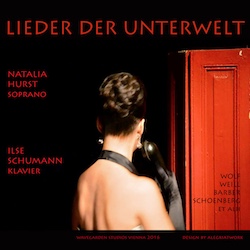
Barber: “Solitary Hotel” (2016)
Piano: Else Schumann
Soprano: Natalia Hurst
CD: Lieder der Unterwelt. Wavegarden Studios (2016)
Purchase: Digital [Amazon]
I don’t have much information about this German release, but “Songs from the Underworld” seems to be a collection of cabaret pieces and “darker” art-songs. “Solitary Hotel” is the only Barber song on the album. I have not heard the track, but Hurst and Schumann have a lovely performance available on YouTube that I rather like. (It could be the actual track itself? It’s unclear.)
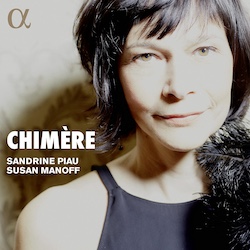
Barber: “Solitary Hotel” (2018)
Piano: Susan Manoff
Soprano: Sandrine Piau
CD: Chimère. Alpha 398 (2018)
Purchase: CD [Amazon], Digital [Presto Music]
Online: YouTube [Album Playlist | Solitary Hotel]
This lovely CD contains a haunting version of “Solitary Hotel.” There’s also an interesting trailer for the album, in which Piau discusses the song—but seems unfamiliar with its literary origins. (All the more fascinating because she more-or-less describes a Joycean epiphany while discussing the song!)
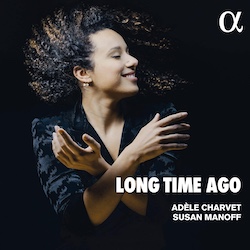
Barber: “Solitary Hotel” (2019)
Piano: Susan Manoff
Mezzo: Adèle Charvet
CD: Long Time Ago. Alpha 556 (2019)
Purchase: CD [Amazon], Digital [Presto Music]
Online: YouTube [Album Playlist | Solitary Hotel]
The French mezzo Adèle Charvet sings four Barber songs on this excellent collection, including an utterly heartbreaking “Solitary Hotel.” Her sensitivity to the lyrics is revelatory—despite hearing this song dozens of times, the final stanza brought tears to my eyes. She’s exquisitely accompanied by Susan Manoff on piano. The whole disc is worth purchasing, an excellent showcase for Charvet’s incredible versatility. Highly recommended.
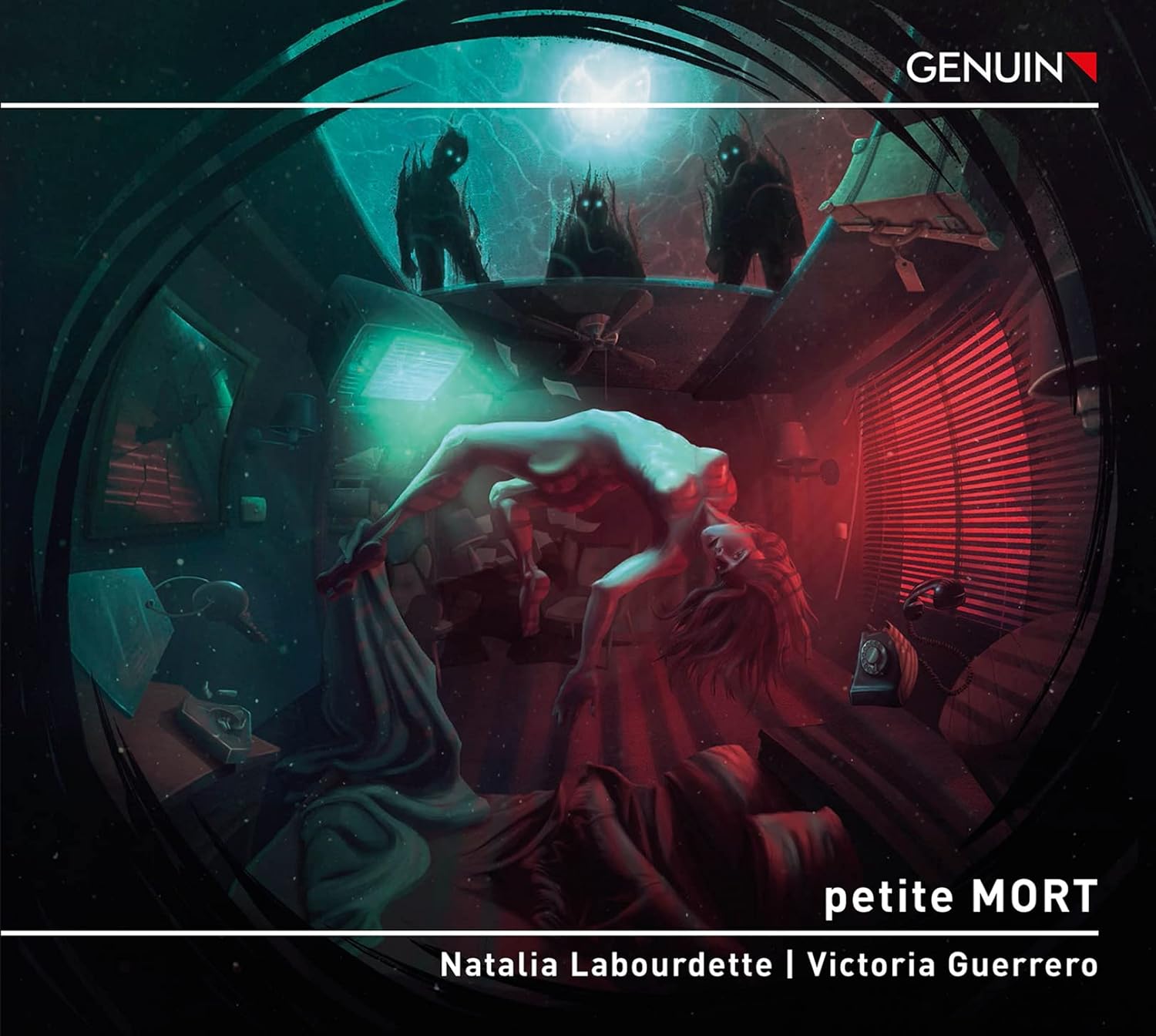
Barber: Despite and Still (2022)
Piano: Victoria Guerrero
Soprano: Natalia Labourdette
CD: petit MORT. Genuin Classics 22782 (2022)
Purchase: CD [Amazon], Digital [Presto Music]
This Spanish disc describes itself as a “concept album” named after the poetic French phrase for an orgasm, “the little death.” Along with Barber’s Despite and Still—not exactly his “orgasm” cycle—it features songs by Berg, Poulenc, Fauré, Korngold, and Turina. It also has a cover stolen from a dark ambient album about space vampires. The Spanish soprano Natalia Labourdette offers a heartfelt but quirky rendition of “Solitary Hotel,” alternating her dynamics wildly and striking the odd word with a flamenco-like passion. Her duende is matched by Victoria Guerrero, whose tango-esque piano takes welcome liberties with phrasing and tempo. This wouldn’t be my first choice to expose someone to Barber’s song, but it’s a unique alternative that rewards repeated listening.
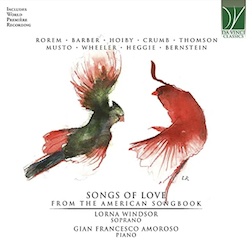
Barber: “Solitary Hotel” (2022)
Piano: Gian Francesco Amoroso
Mezzo: Lorna Windsor
CD: Songs of Love: The American Songbook. Da Vinci Classics C00533 (2022)
Purchase: CD [Amazon], Digital [Presto Music]
English singer Lorna Windsor delivers a dramatic performance of “Solitary Hotel” accompanied by Italian pianist Gian Francesco Amoroso. Although she sings with a pleasantly bright soprano responsive to the lyrics, there’s nothing to distinguish this recording above Piau, Charvet, or Liany. Also, that cover.

Barber: Despite and Still (2023)
Piano: Rosalia Lopez Sanchez
Mezzo: Naama Liany
CD: Daydream. Origin Classical OC33028 (2023)
Purchase: CD [Amazon], Digital [Presto Music]
Online: YouTube [Album Playlist | Solitary Hotel]
French-Israeli mezzo Naama Liany sings Despite and Still, accompanied by Spanish pianist Rosalia Lopez Sanchez. Liany has a powerful voice, but her reading of “Solitary Hotel” struggles finding an even tone—at times she sounds too restrained, at others overly emotive. On the other hand, Lopez Sanchez plays the song beautifully, bringing out Barber’s tango rhythms more sharply than most recordings.
Barber: “Solitary Hotel”
Piano: Stanisław Bromboszcz
Baritone: Maciej Bartczak
CD: Joyce In Songs. CD Accord ACD310 (2024)
Purchase: CD [Amazon], Digital [Presto Music]
Online: YouTube [Album Playlist]
This Polish album showcases songs inspired by the poetry of James Joyce. It includes Samuel Barber’s Three Songs, op. 10 and “Solitary Hotel,”
Józef Świder’s Chamber Music suite, three Chamber Music songs from Ben Moore, and two world premieres: Wojciech Stępień Wind Whines, a setting of three poems from Pomes Penyeach; and Marta Kleszcz’s Two Songs, settings of Chamber Music Poem XI and Poem XIV. The set concludes with Joyce’s friend Edmund J. Pendleton’s “Bid Adieu,” with lyrics adapted from Poem XI. All the pieces are sung by Polish baritone Maciej Bartczak, who is accompanied on piano by Stanisław Bromboszcz.
Bartczak has a lovely baritone; a bit fuzzy at the edges, but possessing a wide emotional range. His “Rain has fallen” is among the saddest versions I’ve heard, while “Sleep now” is cradled in a gentle hush. He’s unable to shake a Polish accent that occasionally distorts the English lyrics, but his sincerity carries the listener through these melancholy landscapes. Not so with “I hear an army.” The song’s galloping pace and frantic lyrics expose Bartczak’s linguistic limitations, and his delivery is comically bad. While one can overlook—or even appreciate—a mild accent, Bartczak hammers the lyrics over an Eastern European anvil until prose and meter are bent hopelessly out of shape: “I hear an army charting up of th’lend, and the T’UNder of horsezzPLANging, foam-and-all-their knees, erro-GENT inbleck armer, be’hinthem stend…” It’s that bad. Additionally, he makes some inexplicable decisions in phrasing that swallow up key words.
Fortunately Bartczak’s accent is less distracting on “Solitary Hotel.” He approaches the song like a storyteller, unfolding the narrative with a theatrical intensity over Bromboszcz’s pensive piano.
All in all, this recording is most valuable as a showcase for lesser-known Polish composers such as Józef Świder, Wojciech Stępień, and Marta Kleszcz. If you’re mostly interested in the Barber songs, much better options are available. (To be fair, the same can be said about Ben Moore’s songs, three of which were covered by Deborah Voigt on All My Heart.)
Online Video
There are many performances of Barber’s “Solitary Hotel” available on YouTube. The following is just a sample:
Barber: “Solitary Hotel”
Soprano: Sona Ghazarian, Piano: Adolph Henning
This dramatic rendition was recorded at the Bregenz Festspielhaus. I like the way Ghazarian exclaims, “What?” rather than singing it.
Barber: “Solitary Hotel”
Soprano: Roberta Alexander, Piano: Tan Crone
This video was recorded in 1993 for the Dutch public broadcast organization VPRO. A long-time champion of Barber’s songs, Alexander sings with incredible precision, staring directly into the camera and feeling every word. While her exaggerated stage expressions are less effective three feet from the camera, if you can overlook the awkward melodrama, Alexander’s reading of the song is superb.
Barber: “Solitary Hotel”
Tenor: Lukasz Rosiak, Piano: Alina Hoffman
An unfortunately low-fidelity recording from 19 October 2005.
Barber: “Solitary Hotel”
Baritone: Thomas Hampson, Piano: Wolfram Rieger
A live performance from 28 October 2010. Recorded at the Coolidge Auditorium, Washington, DC during the Favorites from the Song of America Tour.
Barber: “Solitary Hotel”
Tenor: Max Zander, Piano: Nikolay Verevkin
A senior recital recorded in 2014.
Barber: “Solitary Hotel”
Soprano: Natalia Hurst, Piano: Ilse Schumann
Recorded live in 2018, this is a lovely performance marred only by the bizarre decision to display images of Edward Hopper paintings instead of keeping the camera on the lovely and expressive Natalia Hurst.
Additional Information
Library of Congress Samuel Barber Collection
The Library of Congress holds several Barber works available for viewing as PDFs, including the original scores to “Rain has fallen,” “Solitary Hotel,” and “I hear an army.”
Samuel Barber: Other Joyce-Related Works
Samuel Barber Main Page
Return to the Brazen Head’s Samuel Barber profile.
Songs from Chamber Music (1935-1937)
These six songs are settings of poems from Chamber Music.
Nuvoletta (1947)
A playful song with lyrics adapted from Finnegans Wake.
Fadograph of a Yestern Scene (1971)
A short instrumental inspired from a line in Finnegans Wake.
“Now have I fed and eaten up the rose” (1972)
This song is based on James Joyce’s translation of a German poem by Gottfried Keller. It’s about a man who is buried alive.
Author: Allen B. Ruch
Last Modified: 29 June 2024
Joyce Music Page: Bronze by Gold
Main Joyce Page: The Brazen Head
Contact: quail(at)shipwrecklibrary(dot)com

